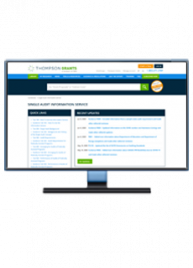Sneak Preview: 2024 Revised Uniform Guidance Becomes Effective for New Awards

(The following was excerpted from a recent Thompon Grants Compliance Expert article.) Recipients and subrecipients receiving new federal financial assistance awards or modifications to existing awards will now follow the 2024 revisions to the uniform guidance (2 C.F.R. Part 200), which became effective Oct. 1. Amendments to other parts within subtitle A of Title 2 of the Code of Federal Regulations also now apply to these awards.
The Office of Management and Budget (OMB) issued final guidance on April 22 that revised the uniform guidance and the other parts of Title 2, which include Part 25, Universal Identifier and System for Award Management; Part 170, Reporting Subaward and Executive Compensation Information; Part 175, Award Term for Trafficking in Persons; Part 180, OMB Guidelines to Agencies on Governmentwide Debarment and Suspension (Nonprocurement); Part 182, Governmentwide Requirements for Drug-Free Workplace (Financial Assistance); Part 183, Never Contract with the Enemy; and Part 184, Buy America Preferences for Infrastructure Projects. The revisions aimed to simplify the guidance by putting it in “plain English”; reduce agency and recipient burdens; make notices of funding opportunity easier to understand to encourage submissions by a broader range of applicants; and promote administrative priorities.
The updated guidance includes one new provision at §200.217 on whistleblower protections. This provision states that “an employee of a recipient or subrecipient may not be discharged, demoted or otherwise discriminated against as a reprisal for disclosing to a person or body described in paragraph (a)(2) of 41 U.S.C. 4712 information that the employee reasonably believes is evidence of gross mismanagement of a federal contract or grant, a gross waste of federal funds, an abuse of authority relating to a federal contract or grant, a substantial and specific danger to public health or safety, or a violation of law, rule or regulation related to a federal contract (including the competition for or negotiation of a contract) or grant. The recipient and subrecipient must inform their employees in writing of employee whistleblower rights and protections under 41 U.S.C. 4712.”
In addition, the revised guidance also adds four new definitions under §200.1 in subpart A: continuation funding, for-profit organization, participant and prior approval.
One of the key updates in the guidance — which now generally uses the term “recipient and subrecipient” instead of “nonfederal entity” in subparts A-E — is the increase in the single audit threshold from $750,000 in federal funds awarded annually to $1 million, effective for recipient fiscal years starting Oct. 1, 2024 (§200.501). Therefore, awardees should be aware that this increase essentially will first apply to audits for many entities beginning with that Oct. 1, 2024-Sept. 30, 2025, fiscal year. For example, the single audit threshold for an entity with a July 1, 2024,-June 30, 2025, fiscal year would still be $750,000.
There are numerous other provisions within the guidance that become effective Oct. 1.
(The full version of this story has now been made available to all for a limited time here.)
Join us for our following Thompson Grants event:
Federal Grants Forum: Navigating the 2024 Uniform Guidance Changes | Oct. 29-30, 2024 | Virtual Event
Thompson Grants Workshop: Subrecipient Monitoring |Nov. 13, 2024 | Virtual Event



